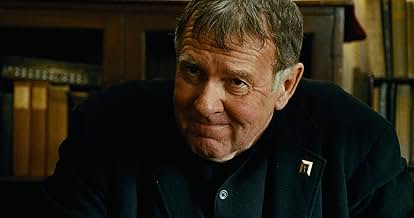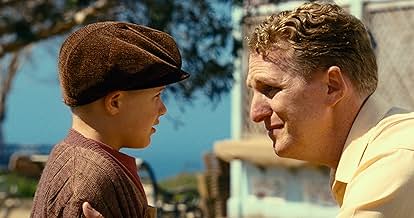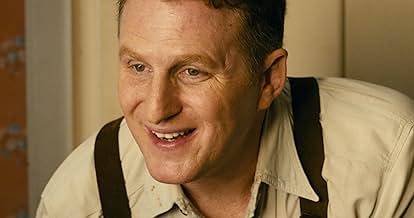PUNTUACIÓN EN IMDb
7,3/10
24 mil
TU PUNTUACIÓN
Un niño de 8 años está dispuesto a todo por acabar la segunda guerra mundial y traer a su padre de vuelta a casa. La historia revela en amor de la relación padre e hijo.Un niño de 8 años está dispuesto a todo por acabar la segunda guerra mundial y traer a su padre de vuelta a casa. La historia revela en amor de la relación padre e hijo.Un niño de 8 años está dispuesto a todo por acabar la segunda guerra mundial y traer a su padre de vuelta a casa. La historia revela en amor de la relación padre e hijo.
- Premios
- 2 nominaciones en total
Ali Landry Monteverde
- Ava
- (as Ali Landry)
Andy Geller
- Dr. Foley
- (as Andrew Geller)
C.K. McFarland
- Doris
- (as CK McFarland)
Argumento
¿Sabías que...?
- CuriosidadesThe earthquake in the movie really happened in real life in Los Angeles three months before the bomb detonation in Hiroshima.
- PifiasWhen the mother is on the front porch reading the paper, the headline states that the Allied Leaders were meeting in "Postdam." The city hosting the meeting was "Potsdam."
- Citas
[repeated line]
James Busbee: Do you believe you can do this?
- ConexionesReferenced in Midnight Screenings: Little Boy (2015)
- Banda sonoraHappy Days Are Here Again
Music by Milton Ager (ASCAP), Lyrics by Jack Yellen (ASCAP)
Performed by Johnny Marvin and His Orchestra, Courtesy of RCA Records
Label by arrangement with Sony Music Licensing
Used by permission. All rights controlled & administered by EMI Robbins Catalog Inc. and Advanced Music Corp (ASCAP)
Reseña destacada
LITTLE BOY is a decent film that I didn't know was a faith-based endeavor until people started complaining about it. Having watched and reviewed Christian films in the past (THE RELIANT, LEFT BEHIND, and THE SHACK come immediately to mind), films that objectively weren't very good, this movie didn't strike me as being a part of that melieu. It may or may not be, but it is certainly a cut above the others in terms of acting, writing, and production values. If its intent is overtly evangelical, the filmmakers did a good job of making it palateable and provide a good example of what faith films should aspire to if their real intent is outreach rather than preaching to the choir.
Nevertheless, LITTLE BOY is at the very least perceived as a Christian film, and that means it's open season for derisive and cynical critique. For example, some smugly insist, without citing any specifics, that LITTLE BOY is "historically inaccurate." Let's unpack that.
Pearl Harbor was bombed in a surprise attack on December 7, 1941 (coincidentally 81 years ago today) and, as a result, we fought a war against the Japanese in the Pacific. That's straight-up real.
Intrinsic to LITTLE BOY's plot is the notion that innocent Japanese-Americans were mistreated, stolen from, and forced into internment camps before being released penniless and without apology near the end of the War. Yes, that happened.
When these innocent Japanese-Americans were finally freed, they were hated, discriminated against, and outright abused based on the fact that they had the "face of the enemy." Check.
(The book Infamy, by Robert Reeves, covers Japanese-American internment in significant detail. I recommend it.)
In early August of 1945, we used an atomic bomb -- two of them in fact -- in Japan, and one was nicknamed Little Boy. Two cities with which we all are familiar were obliterated. Incontrovertibly true.
Americans were held as prisoners of war in the Pacific theater. Some died and some came home. Most, if not all, were brutalized. Um, yeppers.
That's literally the full extent of the history that's even touched upon in this movie, and none of it is false. Should there have been more? Should the reasons why all these things happened have been addressed? Should events have been better contextualized? Maybe, but that would have made for a very, very long and very different film.
Instead, this movie maintains its focus on the story of an American boy of the era and, as such, doesn't dwell too much on the morality, or lack thereof, of the War in the Pacific and its belligerants. Rather, it spends its time contemplating matters at home and matters of personal integrity, exploring the concept that we should treat all people with kindness and judge all as human beings based on their individual merits. Cries that this is a racist film based on the depiction of things that really happened simply don't hold up. Cries that this must be a racist film because it's connected to Christianity are even dumber and reveal more about the complainant than about the film itself.
Where LITTLE BOY fails, to the extent that it fails at all, is in its simplistic vision of a very complicated world in which faith usually doesn't move mountains but, instead, helps us to climb over them, and sometimes even then with great difficulty. Had the filmmakers resisted the urge to offer up a traditional happy ending with smiles and hugs and happy tears all around, it would have been better for the overall effort. A smidgen more imagination and, dare I say it, inspiration might have led to an uplifting ending that didn't undermine everything that preceded it.
Without doubt, LITTLE BOY sports themes rooted in faith, but that's not all there is to it. As a work of cinema, it's so much more. Still, if all viewers can bring to the party is an abiding hostility toward God, religion, and the devout, they'll miss all good stuff and will instead stretch for criticisms that are poisoned by ideology and not informed by what's actually presented. And that's really a shame.
Nevertheless, LITTLE BOY is at the very least perceived as a Christian film, and that means it's open season for derisive and cynical critique. For example, some smugly insist, without citing any specifics, that LITTLE BOY is "historically inaccurate." Let's unpack that.
Pearl Harbor was bombed in a surprise attack on December 7, 1941 (coincidentally 81 years ago today) and, as a result, we fought a war against the Japanese in the Pacific. That's straight-up real.
Intrinsic to LITTLE BOY's plot is the notion that innocent Japanese-Americans were mistreated, stolen from, and forced into internment camps before being released penniless and without apology near the end of the War. Yes, that happened.
When these innocent Japanese-Americans were finally freed, they were hated, discriminated against, and outright abused based on the fact that they had the "face of the enemy." Check.
(The book Infamy, by Robert Reeves, covers Japanese-American internment in significant detail. I recommend it.)
In early August of 1945, we used an atomic bomb -- two of them in fact -- in Japan, and one was nicknamed Little Boy. Two cities with which we all are familiar were obliterated. Incontrovertibly true.
Americans were held as prisoners of war in the Pacific theater. Some died and some came home. Most, if not all, were brutalized. Um, yeppers.
That's literally the full extent of the history that's even touched upon in this movie, and none of it is false. Should there have been more? Should the reasons why all these things happened have been addressed? Should events have been better contextualized? Maybe, but that would have made for a very, very long and very different film.
Instead, this movie maintains its focus on the story of an American boy of the era and, as such, doesn't dwell too much on the morality, or lack thereof, of the War in the Pacific and its belligerants. Rather, it spends its time contemplating matters at home and matters of personal integrity, exploring the concept that we should treat all people with kindness and judge all as human beings based on their individual merits. Cries that this is a racist film based on the depiction of things that really happened simply don't hold up. Cries that this must be a racist film because it's connected to Christianity are even dumber and reveal more about the complainant than about the film itself.
Where LITTLE BOY fails, to the extent that it fails at all, is in its simplistic vision of a very complicated world in which faith usually doesn't move mountains but, instead, helps us to climb over them, and sometimes even then with great difficulty. Had the filmmakers resisted the urge to offer up a traditional happy ending with smiles and hugs and happy tears all around, it would have been better for the overall effort. A smidgen more imagination and, dare I say it, inspiration might have led to an uplifting ending that didn't undermine everything that preceded it.
Without doubt, LITTLE BOY sports themes rooted in faith, but that's not all there is to it. As a work of cinema, it's so much more. Still, if all viewers can bring to the party is an abiding hostility toward God, religion, and the devout, they'll miss all good stuff and will instead stretch for criticisms that are poisoned by ideology and not informed by what's actually presented. And that's really a shame.
- vandeman-scott
- 6 dic 2022
- Enlace permanente
Selecciones populares
Inicia sesión para calificar y añadir a tu lista para recibir recomendaciones personalizadas
- How long is Little Boy?Con tecnología de Alexa
Detalles
- Fecha de lanzamiento
- Países de origen
- Sitios oficiales
- Idioma
- Títulos en diferentes países
- El gran pequeño
- Localizaciones del rodaje
- Los Cabos, Baja California Sur, México(Rosarito, Baja California, Mexico)
- Empresas productoras
- Ver más compañías en los créditos en IMDbPro
Taquilla
- Presupuesto
- 20.000.000 US$ (estimación)
- Recaudación en Estados Unidos y Canadá
- 6.485.961 US$
- Fin de semana de estreno en EE. UU. y Canadá
- 2.750.356 US$
- 26 abr 2015
- Recaudación en todo el mundo
- 17.572.289 US$
- Duración1 hora 46 minutos
- Color
- Mezcla de sonido
- Relación de aspecto
- 2.35 : 1
Contribuir a esta página
Sugerir un cambio o añadir el contenido que falta

Principal laguna de datos
What is the Canadian French language plot outline for Little Boy (2015)?
Responde





































